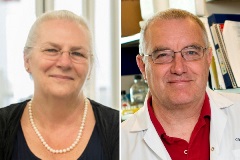MOHCCN announces second group of projects to receive funding through the Pan-Canadian Projects program

The Marathon of Hope Cancer Centres Network is happy to introduce the second group of projects to receive funding through its newly created Pan-Canadian Projects program. This program, which expands on work done by Network members at regional consortiums throughout the country, is uniting researchers and clinicians from multiple provinces to work on projects that accelerate precision medicine for cancer in Canada.
Today’s announcement introduces four new recipients, raising the number of announced projects to eight. In total, the Network will fund 20 such groups, representing a multi-million-dollar investment over the next three years that will contribute roughly 6,000 cases to the MOHCCN Gold Cohort, the largest and most complete cancer case resource in Canada. Remaining projects will be announced over the next few months as Network agreements are signed.
“The projects we are announcing today are great examples of why the collaborations built by the Marathon of Hope Cancer Centres Network are so important for cancer patients,” says Dr. André Veillette, executive director of the MOHCCN. “These projects focus on aggressive and rare cancers. In all these cases, no single cancer centre has enough data and patients to have a big impact on research in these areas, but by pulling together data and resources, these teams will be able to make discoveries that will impact the lives of cancer patients now and into the future.”
“These new synergies supported by the Network – and the data and discoveries they produce – illustrate the incredible impact that we can have on the Canadian cancer research and care landscape when we unite under a single vision.”
Introducing the recipients
These projects will last three years. In the next year, these four groups will receive a total of $1,776,000 from the Network, with additional funds from partner institutions adding up to a total investment of $3,531,000. Further funding over the following two years will be determined based on the number of cases that each group is able to contribute to the MOHCCN Gold Cohort.
These groups will focus on rare gynecological cancers, high-grade serous ovarian cancer, rare breast cancers, and pancreatic cancers.
The first project, led by Dr. Mark Carey (BC Cancer), will focus on a group of rare gynecological cancers that include low-grade serous ovarian carcinomas (LGSOC), clear cell ovarian carcinomas (CCOC), mucinous ovarian carcinomas (MOC), small cell cervix carcinomas (SCNC), HPV-independent vulvar carcinomas (HPV-I SCC) and miscellaneous rare gynecologic cancers. Using MOHCCN funding, the group, which includes collaborators in British Columbia, Saskatchewan, Ontario and Quebec, will collect samples of these rare cancers and perform genomic sequencing to uncover the molecular changes that drive them.
The second project, led by Drs. Amit Oza and Stephanie Lheureux at the Princess Margaret Cancer Centre brings together researchers from Ontario, British Columbia and Quebec to investigate why certain patients with an aggressive form of ovarian cancer known as high-grade serous ovarian cancer respond to a promising therapy that uses a class of drugs called PARP inhibitors, while other patients do not respond to the same drugs.
The third project, led by Dr. Morag Park at the Rosalind and Morris Goodman Cancer Institute in Montreal will focus on metaplastic breast cancer (MpBC), an aggressive but rare disease that affects less than 1 per cent of all patients diagnosed with breast cancer in Canada. The team unites experts from institutions in Quebec, British Columbia, Alberta and Ontario, who will come together to collect, share and analyze data from patients diagnosed with MpBC. Their goal will be to use this data to gain an in-depth understanding of all MpBC cells, with the goal of finding better ways to treat these cancers.
The fourth project, co-led by Drs. Erica Tsang (Princess Margaret Cancer Centre), George Zogopoulos (Research Institute of the McGill University Health Centre and Goodman Cancer Institute) and Daniel Renouf (BC Cancer) will help support a clinical trial that will use next generation sequencing to help match pancreatic cancer patients to personalized therapies, accelerating the implementation of precision medicine for patients with this deadly disease.
About the MOHCCN Pan-Canadian Projects
The 20 groups that will eventually make up the MOHCCN Pan-Canadian Projects were selected after a two-year process that began with a call for White Papers in November 2021.
After an administrative review from network staff, White Paper authors were contacted for their authorization to share their proposals with members of the MOHCCN Scientific Questions Working Group (SQWG) and collaborators.
The SQWG reviewed the White Papers and identified four themes emerging from the proposals that would be the basis for future projects. These themes – (i) mechanisms of drug resistance, (ii) dynamic biomarkers, (iii) prospective treatment assignment based on molecular/immune characterization and (iv) understanding cancer biology of rare and understudied cancer subtypes – along with a review criterion for a Request for Applications, were then endorsed by MOHCCN Network Council, and a request for applications was sent out. Out of the 35 applications received, 20 groups were selected to receive funding after undergoing peer review.
No single cancer centre has enough data and patients to have a big impact on research in these areas, but by pulling together data and resources, these teams will be able to make discoveries that will impact the lives of cancer patients
Related Team Members
-
Amit
Researcher
Oza -
Morag
MOHCCN Network CouncilConsortium LeaderProject Leader
Park -
Stéphanie
Project Leader
Lheureux -
Daniel
MOHCCN Steering CommitteeConsortium LeaderWorking Group Member
Renouf -
George
MOHCCN Steering CommitteeInstitutional LeadWorking Group ChairWorking Group Member
Zogopoulos -
Mark
Researcher
Carey -
Erica
Researcher
Tsang
Projects
-
Regional Consortia
Pan-Canadian Projects
- Canada Wide
Building on work done by Regional Consortia across the country, the Pan-Canadian Projects program unites researchers and clinicians from multiple provinces to work on projects that accelerate precisio...Read more
Related News
-

An incredible milestone! A letter from Dr. André Veillette
Today, we’re proud to announce that we’ve reached our initial goal of sequencing 15,000 cancer genomes. -

Marathon of Hope Cancer Centres Network launches its 2026 Health Informatics & Data Science Award competition
The Marathon of Hope Cancer Centres Network is excited to announce the launch of its 2026 funding competition for early career health informaticians and data scientists. -

Marathon of Hope Cancer Centres Network achieves goal of sequencing 15,000 genomes for game-changing cancer dataset
The Marathon of Hope Cancer Centres Network (MOHCCN), a pan-Canadian initiative led by the Terry Fox Research Institute and the Terry Fox Foundation, today announced that it had achieved its goal of s... -

Long-time Terry Fox-funded researchers, leaders and mentors Drs. Anne-Marie Mes-Masson and John Bell appointed to the Order of Canada
Drs. Anne-Marie Mes-Masson and John Bell, two distinguished researchers with deep and long-time connections to the Terry Fox Research Institute, have been appointed to the Order of Canada, one of the ...
